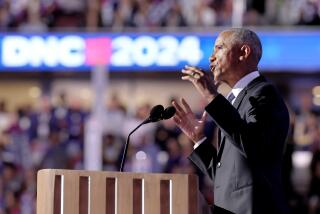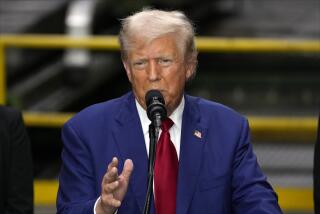Party Chief Won’t Break Up Scuffles
- Share via
DES MOINES — Democratic Party National Chairman Terry McAuliffe has no plans to play referee to what has become a vitriolic presidential primary, saying through a spokeswoman Monday that voters would decide whether the negative campaigning was good politics.
His comments came a day after Howard Dean, the Democratic front-runner, criticized McAuliffe for not stepping in to stem the growing attacks on Dean by other candidates -- in particular Connecticut Sen. Joe Lieberman, Massachusetts Sen. John F. Kerry and Rep. Dick Gephardt of Missouri.
Dean’s call for a cease-fire to campaign hostilities sparked a new round of assaults.
“I’ve got news for Howard Dean: The primaries are a warm-up compared to what George Bush and Karl Rove have waiting for the Democratic nominee,” Lieberman said. “If Howard Dean can’t stand the heat in the Democratic kitchen, he’s going to melt in a minute once the Republicans start going after him.”
The spat surfaced even as the Dean campaign continued to show strong grass-roots support.
On Monday, the Dean campaign announced that it has raised more than $14 million for the quarter, which ends Wednesday. That would put his fundraising total for the year at about $40 million, far more than the amounts raised by any of his eight rivals in the Democratic race. Much of Dean’s money came through small donations via the Internet.
The day’s political wrangling focused on Dean’s suggestion, made while campaigning Sunday in Iowa, that McAuliffe needed to intervene to stop the public attacks by Dean’s rivals. “If we had strong leadership in the Democratic Party, they would be calling those other candidates and saying, ‘Hey, look, somebody’s going to have to win here,’ ” Dean said.
Experts say that continued attacks by fellow Democrats could weaken Dean in the general election -- if he emerges as the Democratic nominee -- by spotlighting his potential weaknesses to Republicans and essentially giving them a road map to campaign against him.
“The rhetoric used against him is right on that fine line between legitimate criticism and what many may feel is overly harsh personal attacks,” said Democratic strategist Anita Dunn, who is neutral in the race. “What these candidates need to know is that the Republicans are watching.”
Another fallout of the attacks, Dean said, is that they could dissuade many of his followers -- especially those drawn into the campaign through the Internet -- from supporting another candidate if he loses the nomination.
But with Iowa caucuses less than three weeks away, several of Dean’s rivals are making a concerted effort to derail him and bolster their own chances for the nomination. Gephardt’s campaign sees winning in Iowa as a must. And Kerry is hoping a strong showing in Iowa will boost his prospects in New Hampshire.
As a result, some characterized Dean’s call for the national party’s intervention as an unrealistic expectation that fails to take into account the nature of high-stakes politics.
McAuliffe is on vacation and could not be reached for comment Monday. But his spokeswoman, Debra DeShong, said he did not intend to intervene in the primary to stop the strife among the candidates.
“Look, this Democratic primary is no different than any other over the last 20 years. Politics is a combat sport,” she said.
DeShong added that McAuliffe believes “that voters will decide for themselves” whether the attacks on Dean were justified.
Previous sniping among candidates includes such one-liners as Republican White House hopeful George H.W. Bush criticizing rival Ronald Reagan for advocating what Bush termed “voodoo economics” in 1980, and Democrat Walter F. Mondale questioning the substance of Gary Hart’s ideas by asking, “Where’s the beef?” during their 1984 battle. In the 2000 Democratic primary, Bill Bradley accused Al Gore of jumping “into bed with special interests.”
For weeks, Dean has been the focus of criticism, both in the press and in televised debates, about his record as governor of Vermont, his experience in foreign policy and his positions on major issues. In contrast to past primaries, Dean’s quick emergence as the favored Democrat in the 2004 race has caused rivals to focus on a single candidate earlier than usual.
Dunn said the attacks against Dean are much harsher than George W. Bush faced in the 2000 Republican primary, which also featured a large number of hopefuls.
“Howard Dean is much more of a target and has been for the last six months,” she said.
Late Monday, Dean’s camp sought to downplay his comments about the need for a party leader to intervene. Senior advisor Gina Glantz said the former governor was responding to a three-week stretch of attacks.
“These candidates have had more to say that is negative than is positive,” she said. “They announce they’re giving policy speeches that turn out to be speeches about Howard Dean.”
Dean aide Kate O’Connor said that on Monday morning Dean called McAuliffe, who helped raise money for Gephardt’s first presidential bid in 1988. “He just called to have a discussion about what was in the papers. It was a very, very friendly conversation,” O’Connor said.
But Dean’s opponents were anything but friendly Monday as Kerry called Dean’s weekend statements “part of a pattern.”
“He was the first candidate to attack in this campaign and the first to run negative ads, and he has been attacking Democrats and their accomplishments during the Clinton years from day one of this race,” Kerry said.
Gephardt said Dean must endure his own tactics.
“Howard Dean has spent the last year criticizing me and other candidates at every opportunity,” Gephardt said. “Now as he makes a series of embarrassing gaffes that underscore the fact that he is not equipped to challenge George Bush, he suddenly wants to change the rules.”
Opponents say Dean’s appeal to McAuliffe demonstrated a naivete about the presidential campaign process.
Said Democratic pollster John Anzalone: “If you’re the front-runner, you’re the one with the target on your forehead. It’s no different whether you’re running for president or dogcatcher. Such sniping is the dynamics of politics, period.”
Joe Lockhart, a White House spokesman in the Clinton administration, likened Dean to a fighter who flinched at return blows. “When he’s attacked, he says it’s time to take his marbles and go home,” he said. “What does he think will happen if he gets the nomination? Does he think the Bush people will say, ‘Let’s have polite debate’? Who’s he going to call then -- his mother?”
*
Times staff writers Nick Anderson in Creston, Iowa, and Mark Z. Barabak in Manchester, N.H., contributed to this report.
More to Read
Get the L.A. Times Politics newsletter
Deeply reported insights into legislation, politics and policy from Sacramento, Washington and beyond. In your inbox twice per week.
You may occasionally receive promotional content from the Los Angeles Times.









